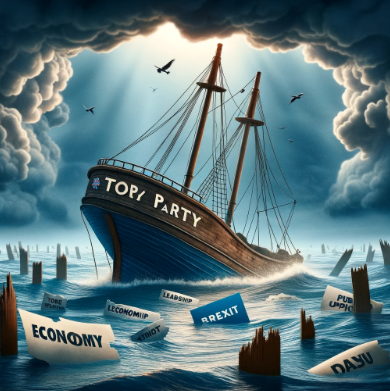The Conservative Party’s significant losses in the 2024 UK elections can be attributed to a combination of factors:
- Economic Concerns: High levels of taxation, cost of living issues, and economic management have been major concerns. There has been a broad discontent with the government’s handling of the economy, which has significantly impacted public opinion against the Conservatives (The Independent).
- Tactical Voting: There has been a considerable increase in tactical voting, where voters across different opposition supporters united to vote against Conservative candidates. This strategy significantly affected the number of seats won by the Conservatives, as opposition voters aligned to ensure the defeat of Conservative candidates in key constituencies (The Independent).
- Leadership and Party Popularity: Under Rishi Sunak’s leadership, the party struggled with popularity issues, partly due to internal party divisions and challenges in addressing major national issues. The leadership did not resonate well enough with voters to regain trust and support after previous challenges (Liverpool University News).
- Public Perception and Strategic Failures: The party’s strategies and campaign messages may not have effectively addressed or resonated with the electorate’s concerns. Combined with the public’s reaction to their governance, particularly on issues like immigration and public services, there was a significant swing against them (Liverpool University News).
- Brexit Aftermath: The long-term economic and social effects of Brexit may have continued to influence voter sentiment. Discontent with how the government managed post-Brexit trade and economic issues could have swayed public opinion against the Conservatives.
- Public Service Concerns: Dissatisfaction with the state of public services, including health and education, under Conservative governance could have played a role. Many voters might have felt that the party did not adequately address these crucial areas during their term.
- Party Fragmentation and Leadership Challenges: Internal divisions within the Conservative Party and controversies surrounding its leadership could have eroded voter trust and cohesion within the party. Leadership disputes and a lack of a clear, unified direction may have discouraged traditional Conservative voters.
- Global Economic Conditions: Global economic challenges, such as inflation and supply chain issues, may have exacerbated domestic economic difficulties, making the government’s economic policies appear less effective.
- Media Influence and Campaign Strategies: The way media portrayed the Conservative Party and their campaign strategies could have also impacted voter perceptions and turnout. Negative press and ineffective campaign messaging may have further alienated potential voters.
These elements collectively created a challenging environment for the Conservatives, leading to one of their worst performances in recent history. The strategic and situational missteps, especially in handling the economy and public perception, were critical in their electoral outcomes.
More other information:
⬇️ 信用分數5個月內增長200分達「良好」🚀 💳 輕鬆獲批英國 Zilch 信用卡: ⬇️🌟 📈 提升信貸評分
💷 現在申請即獲得£5獎勵
🛍️ 知名網上商店2%的現金回贈 (Amazon, Ikea, Currys, Booking.com, Nike, Zooplus)
💵🔙 任何消費0.5%現金回贈
⬆️ 🍎連接Apple Pay更方便 ⬆️
Please follow us:
📱 Please join our whatsapp broadcast list 請加入我哋嘅WhatsApp廣播名單 📺📱 Our facebook and whatsapp groups 🗣 ️
📱 UK Property list updates 🏠
